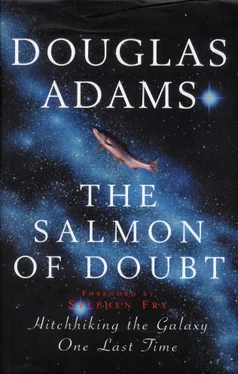Stanley wasn’t a good downpour. Nothing wrong with a good downpour for clearing the air. Stanley was the sort of thing you needed a good downpour to clear the air of. Stanley was muggy, close, and oppressive, like someone large and sweaty pressed up against you in a tube train. Stanley didn’t rain, but every so often he dribbled on you.
Dirk stood outside in the Stanley.
The actor had kept him waiting for over an hour now, and Dirk was beginning to wish that he had stuck by his own opinion that actors never got up in the morning. Instead of which he had turned up rather eagerly outside the actor’s flat at about 8:30 and then stood behind a tree for an hour. Nearly an hour and a half now. There was a brief moment of excitement when a motorcycle messenger arrived and delivered a small package, but that was about it. Dirk lurked about twenty yards from the actor’s door.
The Motorcycle Messenger Arrival Incident had surprised him a bit. The actor didn’t seem to be a particularly prosperous one. He looked as if he were more in the still-knocking-on-people’s-doors bit of his career than in the having-scripts-biked-round-to-him bit.
He even consulted his own horoscope in one of the papers, the one written by a disreputable friend of his who toiled unscrupulously under the name of The Great Zaganza. First he glanced at some of the entries under other birth signs, just to get a feel for the kind of mood the GZ was in. Mellow, it seemed, at first sight. “Your ability to take the long view will help you though some of the minor difficulties you experience when Mercury ...,” “Past weeks have strained your patience, but new possibilities will now start to emerge as the sun ... ,” “Beware of allowing others to take advantage of your good nature.
Resolve will be especially called for when ...” Boring, humdrum stuff. He read his own horoscope.
“Today you will meet a three-ton rhinoceros called Desmond.” Dirk clapped the paper shut in irritation, and at that moment the door suddenly opened. The actor emerged with purposeful air. He was carrying a small suitcase, a shoulder bag, and a coat. Something was happening. Dirk glanced at his watch. Three minutes past ten. He made a quick note in his book. His pulse quickened.
A taxi was coming down the street towards them. The actor hailed it. Damn! Something as simple as that. He was going to get away. The actor climbed into the cab and it drove off down the street, past Dirk. Dirk swivelled to watch it, and caught a momentary glimpse of the actor looking back through the rear window. Dirk watched helplessly and then glanced up and down the street in the vain hope that ...
Almost miraculously a second taxi appeared suddenly at the top of the street, heading towards him. Dirk shot out an arm, and it drew to a halt beside him. “Follow that cab!” exclaimed Dirk, clambering into the back. “I been a cabbie over twenty years now,” said the cabbie as he slid back into the traffic. “Never had anybody actually say that to me.” Dirk sat perched on the edge of his seat, watching the cab in front as it threaded its way through the slow, agonising throttle of the London traffic. “Now that may seem like a little thing to you, but it’s interesting, innit?”
“What?” said Dirk.
“Anytime you see anything on the telly where someone jumps in a cab, it’s always ‘Follow that cab,’
innit?”
“Is it? I’ve never noticed,” said Dirk.
“Well, you wouldn’t,” said the cabbie. “You’re not a cabbie. What you notice depends on who you are.
If you’re a cabbie, then what you especially notice when you watch the telly,” continued the cabbie, “is the cabbies. See what the cabbies are up to. See?”
“But on the telly you never actually see the cabbies, see? You only see the people in the back of the cab.
Like, the cabbie’s never of any interest.” “Er, I suppose so,” said Dirk. “Um, can you still see the cab we’re supposed to be following?”
“Oh Yeah, I’m following him OK. So, the only time you ever actually ever see the cabbie is when the fare says something to him. And when a fare says something to a cabbie in a drama, you know what invariably it is.”
“Let me guess,” said Dirk. “Its ‘follow that cab’.”
“Exactly my point! So if what you see on the telly is to be believed, all cabbies ever do,” continued the cabbie, “is follow other cabbies.” “Hmmm,” said Dirk, doubtfully.
“Which leaves me in a very strange position, as being the one cabbie that never gets asked to follow another cabbie. Which leads me to the unmistakeable conclusion that I must be the cabbie that all the other cabbies are following.” Dirk squinted out of the window trying to spot if there was another cab he could switch to.
“Now I’m not saying thats whats actually happening, but you can see how someone might get to thinking that way, can’t you. Its the power of the media, innit?” “There was,” said Dirk, “an entire television series about taxi drivers. It was called, as I recall, Taxi.”
“Yeah. Well. I’m not talking about that, am I?” said the cabbie irrefutably. “I’m talking about the power of the media to selectively distort reality. That’s what I’m talking about. I mean, when it comes down to it, we all live in our own different reality, don’t we? I mean, when it comes down to it.” “Well. Yes. I think you’re right, as a matter of fact,” said Dirk uneasily. “I mean, you take these kangaroos they’re trying to teach language to. What does anone think we’re going to talk about? What are we gonna say then, eh? ‘So, hows the hopping life treating you then?’ ‘Oh fine. Musn’t grumble. This pocket down me front is a bit of a pain though. Always full of fluff and paperclips.’ It isn’t going to be like that. These kangaroos have got brains the size of a walnut whip. They live in a different world, see. It will be like trying to talk to John Selwing Gummer. You see what I’m saying?”
“Can you see the cab we’re following?”
“Clear as a bell. Probably be there before him.”
Dirk frowned. “Be where before him?”
“Heathrow.”
“How on earth do you know he’s going to Heathrow?”
“Any cabbie can tell if another cabbie’s going to Heathrow.”
“What do you mean?”
“You read the signs. Okay, so theres certain obvious thinks like the fare’s carrying luggage. Then theres the route he’s taking. Thats easy. But you say he may just be saying with friends in Hammersmith. All I can say is that the fare didn;t get into the cab in the manner of someone going to stay with friends in Hammersmith. So, what else do you look for. Well, here’s where you need to be a cabbie to know.
“What you notice depends on who you are.”
“You couldn’t happen to tell which flight he’s catching, could you?” asked Dirk. “Who do you think I am, mate,” retorted the cabbie, “a bloody private detective?” Dirk sat back in his seat and stared out of the window, thoughtfully.
THERE MUST BE some kind of disease that causes people to talk like that, and the name for it must be something like Airline Syllable Stress Syndrome. It’s the disease that seems to kick in at about ten thousand feet and becomes more and more pronounced, if that’s a good word to use in this context, with altitude until it levels out at a plateau of complete nonsense at about 35,000 feet. It makes otherwise rational people start saying things like “The captain has now turned off the seatbelt sign,” as if there were someone lurking around the cockpit attempting to deny that the captain has done any such thing, that he is indeed the captain and not an impostor, and that there aren’t a whole bunch of second-rate and inferior seatbelt signs that he mightn’t have been fiddling about with.
Читать дальше










